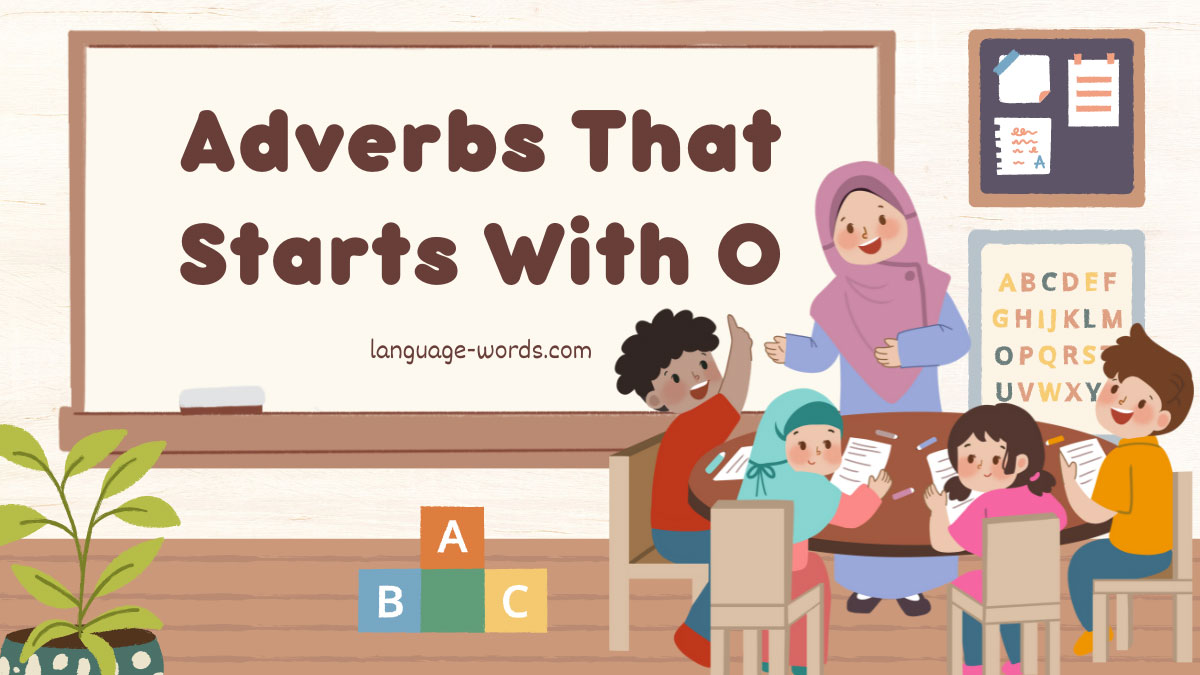Hey there! Are you ready to dive into the fascinating world of adverbs? Well, today we’re going to explore a specific group of adverbs – those that start with the letter “o”. Adverbs are like the unsung heroes of language, adding that extra spice and precision to our sentences. And the “o” adverbs? They’re no exception!
In this article, I’ll walk you through a curated list of adverbs that start with “o”, from the commonly used ones to the more obscure gems. We’ll uncover their meanings, discuss their usage, and even throw in a few examples to help you grasp their true essence. Whether you’re a language enthusiast, a writer, or simply someone looking to expand their vocabulary, this article is for you.
Why “O” Adverbs are Important

Enhancing Meaning and Clarity in Writing
As a language enthusiast, I believe that adverbs play a vital role in adding depth and precision to our sentences. And when it comes to adverbs that start with the letter “O,” they offer a unique and valuable contribution to our language.
One of the reasons why “O” adverbs are important is that they enhance the meaning and clarity in writing. These adverbs provide additional information about the action or verb in a sentence, helping to paint a more vivid picture for the reader.
For example, consider the sentence “She walked.” By adding an adverb like “optimistically,” we instantly gain insight into how she performed the action. The sentence now becomes “She walked optimistically,” giving us a clearer understanding of her demeanor or attitude while walking.
Adding Depth and Dimension to Descriptions
Another reason why “O” adverbs are important is that they add depth and dimension to descriptions. As writers, we strive to create a rich and immersive experience for our readers, and adverbs starting with “O” can help us achieve that.
Take the sentence “The sun shone.” By including the adverb “obscenely,” we transform the sentence into “The sun shone obscenely.” Suddenly, we evoke a sense of exaggeration and intensity, amplifying the impact of the image in the reader’s mind.
These “O” adverbs provide us with an opportunity to amplify emotions, emphasize qualities, and create a more engaging narrative. They serve as powerful tools in our writing arsenal, helping us captivate our readers and bring our words to life.
Adverbs that start with the letter “O” are important as they enhance meaning and clarity in writing while adding depth and dimension to descriptions. By incorporating these adverbs into our writing, we can create more vibrant and engaging sentences that resonate with our readers.
List Of Adverbs That Starts With O

| Overbearingly | Ok’D | Owlishly | Octagonally |
| Oftentimes | Off-Key | Outward | Often |
| Overhastily | Overhand | Obligingly | Observingly |
| Ought | Orally | Offshore | Obviously |
| Opportunely | Ornately | Opulently | Omnivorously |
| Optimistically | Opaquely | On-The-Spot | Operosely |
| Onerously | One-Time | Outboard | Oftener |
| Outdoors | Obliquely | Occasionally | Operationally |
| Once | Overmuch | Ocker | Overnight |
| Oft | Out-Of-Hand | Oversea | Obstructively |
| Open-Mindedly | Obstetrically | Occidentally | Overpoweringly |
| Overrashly | Tominously | Omnisciently | Odiously |
| Off | Objectionably | Objectively | Only |
| Observantly | Obsessively | Orderly | Onside |
| Ostensively | Officially | Occultly | Obtrusively |
| Overfreely | Outstandingly | Osmotically | One-Handed |
| Organizationally | Overtime | Obdurately | Organisationally |
| Out-Of-Bounds | Obsequiously | Ovally | Ochlocratically |
| Over | Overflowingly | Out-Of-Date | Onward |
| Offensively | Overwhelmingly | Overfondly | Other |
| Openly | Off-The-Cuff | Odoriferously | Off-The-Record |
| Outlandishly | Originally | Out | Optically |
| Oddly | One-Sidedly | Optionally | Overboard |
| Othergates | Offhanded | Oviparously | Overhead |
| Officiously | Orbicularly | Otherwise | Operatively |
| Overland | Outrageously | Orthographically | Okay |
| Ordinarily | Overseas | Observably | Overfar |
| Otherwhile | Offendedly | Onboard | Oafishly |
| Onstage | Obliviously | Oracularly | Obnoxiously |
| Outstation | Outright | Overleaf | Overtly |
| Obligatorily | Optatively | Oratorically | Outwards |
| Obstreperously | Outwardly | Out-Of-Doors | Orthogonally |
| Obediently | Obtusely | Onshore | Overside |
| Obscurely | Optimally | Overly | Overall |
| Ontogenically | Oppositely | Obsessionally | Ontogenetically |
| Onwards | Offside | One-On-One | Orientally |
| Ostensibly | Opprobriously | Opinionatively | Overarm |
| Offhandedly | Oppressively | Offhand | Ornithologically |
| Ostentatiously | Otherwhere | Outside | Opposite |
| Okey-Doke | Occupationally | Offishly | Omnipotently |
| Ornamentally | Overlong | Organically | Obsoletely |
| Obstinately | Obscenely |
Common Adverbs Starting with O

Overview of Adverbs Starting with O
When it comes to enhancing the meaning and clarity of our writing, adverbs starting with the letter “O” provide an excellent tool. These adverbs add depth and dimension to our descriptions, allowing us to paint a more vivid picture in the reader’s mind. By incorporating these adverbs into our sentences, we can create more vibrant and engaging writing that resonates with our readers.
Adverbs that start with “O” often describe the manner in which an action is performed or the frequency at which it occurs. They can modify verbs, adjectives, or other adverbs, providing additional information that helps us to better understand the action being described.
Let’s explore some examples of adverbs starting with “O” to see how they are used in sentences.
Examples of Adverbs Starting with O in Sentences
- Openly: I expressed my opinion openly during the meeting, not holding back any thoughts or ideas.
- Obviously: She was obviously upset, her tears staining her cheeks as she spoke.
- Oftentimes: Oftentimes, we underestimate our own abilities and potential.
- Only: We have only just begun our journey towards success, there is still much to accomplish.
- Optimistically: He approached every challenge optimistically, believing in his ability to overcome any obstacle.
- Outwardly: Despite her pain, she smiled outwardly, unwilling to show her true emotions.
- Overnight: The project was a success, thanks to an overnight effort from the entire team.
- Overly: He was overly cautious, always double-checking his work to ensure perfection.
By incorporating these adverbs into our writing, we can create sentences that are more engaging and descriptive. With the ability to modify verbs, adjectives, or other adverbs, adverbs starting with “O” provide an additional layer of detail and clarity that helps our readers fully understand the action being described. So, don’t hesitate to incorporate these adverbs into your writing to make it more vibrant and captivating.
Using Adverbs Starting with O in Different Contexts
Adverbs of Frequency Starting with O
Adverbs of frequency starting with “O” can express how often an action occurs. Here are a few examples of these adverbs and how they can be used:
- Often: I often go to the park with my friends to play.
- Occasionally: We occasionally have picnics by the lake on weekends.
- Once: I can only go on the roller coaster once because it’s a bit scary.
Using adverbs of frequency can provide clarity and help paint a more accurate picture of how often an action takes place.
Adverbs of Manner Starting with O
Adverbs of manner starting with “O” describe how an action is performed. Here are some examples:
- Obviously: The squirrel obviously climbed up the tree to get away from the dog.
- Openly: The children openly laughed and cheered during the funny movie.
- Overjoyedly: The little girl jumped up and down overjoyedly when she received her birthday present.
By incorporating adverbs of manner into your writing, you can add depth and detail to your descriptions, making the actions more vivid and engaging.
Adverbs of Place Starting with O
Adverbs of place starting with “O” indicate where an action takes place. Here are a few examples:
- Outdoors: We love to have picnics outdoors in the park.
- Onboard: We went onboard the ship for a fun cruise vacation.
- Overseas: Our family went on a vacation overseas and visited many different countries.
Using adverbs of place can help set the scene and provide a clearer understanding of where the action is happening.
Adverbs starting with “O” can greatly enhance the richness and clarity of your writing. By incorporating adverbs of frequency, manner, and place, you can create more engaging and descriptive sentences.
Tips for Using Adverbs Starting with O Effectively

Avoiding Redundancy and Wordiness
To use adverbs starting with “O” effectively, it’s important to avoid redundancy and wordiness. Here are some tips to keep in mind:
- Choose the most precise adverb: Instead of using multiple adverbs that convey similar meanings, select the one that best captures the intended message. This helps to keep your writing concise and clear.
- Combine adverbs with verbs: Instead of using an adverb to modify a verb and another adverb to modify the first adverb, combine them into a single phrase. This eliminates unnecessary repetition.
- Consider the context: Ensure that the adverb you choose is relevant to the context of the sentence. It should add meaning and enhance clarity, rather than appear as an unnecessary addition.
Using Adverbs to Modify Verbs, Adjectives, and Other Adverbs
Adverbs starting with “O” can be used to modify verbs, adjectives, and other adverbs, offering more depth and detail to your writing. Here’s how to use them effectively:
- Modifying verbs: Adverbs that start with “O” can provide valuable information about the manner, frequency, or intensity of an action. For example:
- She often sings beautifully.
- Modifying adjectives: Adverbs can also be used to enhance the description of adjectives, adding specific details to bring your writing to life. For example:
- The sunset was extraordinarily beautiful.
- Modifying other adverbs: Adverbs can even modify other adverbs, giving more precise information about the intensity or manner in which something is done. For example:
- She speaks English extremely fluently.
Remember, using adverbs that start with “O” effectively involves choosing the right adverb for the context and avoiding redundancy and wordiness. Incorporating these tips will help you create more engaging and descriptive sentences in your writing.
Conclusion
Using adverbs that start with the letter “O” effectively in writing can greatly enhance the clarity and impact of your sentences. By following a few simple tips, you can avoid redundancy and wordiness, and create more engaging and descriptive writing.
One important tip is to choose the most precise adverb for the context. This will ensure that your adverb accurately conveys the intended meaning and adds depth to your writing. Additionally, combining adverbs with verbs can create more dynamic and vivid descriptions.
Adverbs starting with “O” can be used to modify verbs, adjectives, and other adverbs, allowing you to add specific details and nuances to your writing. By selecting the right adverb and incorporating these tips, you can create sentences that captivate your readers and make your writing more memorable.
Incorporating these techniques into your writing will not only make it more engaging, but also help you communicate your ideas more effectively. So, the next time you’re writing, don’t overlook the power of adverbs that start with “O” – they can truly elevate your writing to the next level.

